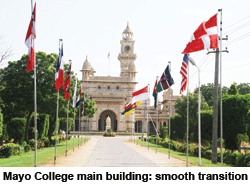Routinely included in all league tables of India’s top boarding schools, this vintage institution is highly regarded for its superb architecture, infrastructure and globally benchmarked education
 One of India’s most renowned public (i.e exclusive, private) primary-secondary schools, over the past 150 years since it was promoted in 1870 to provide British-style public school education to the progeny of pre-independence India’s princes, the Ajmer (Rajasthan)-based all-boys Mayo College has made a smooth transition into a class IV-XII legacy boarding school affiliated with the Delhi-based Central Board of Secondary Education (CBSE). Currently Mayo College has an aggregate enrolment of 845 boys from across India and 11 countries abroad. Routinely included in league tables of India’s Top 10 residential schools, Mayo is ranked no. 6 all-India and no.2 in western India (behind Mayo Girls) in the EducationWorld-C fore India’s Most Respected Schools Survey 2011.
One of India’s most renowned public (i.e exclusive, private) primary-secondary schools, over the past 150 years since it was promoted in 1870 to provide British-style public school education to the progeny of pre-independence India’s princes, the Ajmer (Rajasthan)-based all-boys Mayo College has made a smooth transition into a class IV-XII legacy boarding school affiliated with the Delhi-based Central Board of Secondary Education (CBSE). Currently Mayo College has an aggregate enrolment of 845 boys from across India and 11 countries abroad. Routinely included in league tables of India’s Top 10 residential schools, Mayo is ranked no. 6 all-India and no.2 in western India (behind Mayo Girls) in the EducationWorld-C fore India’s Most Respected Schools Survey 2011.
Highly ranked under the parameters of academic reputation and quality of alumni, this vintage institution sprawled over 187 acres is also highly regarded by the cognoscenti for its superb architecture and landscaping, infras-tructure and globally benchmarked holistic education provision. “Schooling here is a well tried and tested blend of academic excellence, sports, arts, crafts, music and theatre, where India’s cultural legacy happily coexists with modern technological advances,” says Maj. Gen. (Retd) Kanwar Vijay Singh Lalotra, principal of the school. An alumnus of Lawrence School, Sanawar and Madras University, Gen. Lalotra acquired extensive teaching and administrative experience at the Army Infantry School, Defence Staff Services College, Wellington and the Army Training Command before being headhunted as principal of Mayo College in 2010.
 According to Lalotra, the disting-uishing characteristic of Mayo is that it provides a well-balanced education experience combining academic rigour with “globally unparalleled co-curricular and sports facilities” to its students. “Our institutional objective is to develop the self-confidence and leadership qualities of our students,” says Lalotra.
According to Lalotra, the disting-uishing characteristic of Mayo is that it provides a well-balanced education experience combining academic rigour with “globally unparalleled co-curricular and sports facilities” to its students. “Our institutional objective is to develop the self-confidence and leadership qualities of our students,” says Lalotra.
A long-standing member of the Indian Public Schools Conference (estb.1939) — an association of India’s top public schools — Mayo College is managed by a 40-member general council presided over by Gaj Singh, the incumbent titular head of the erstwhile royal family of Jodhpur, and administered by the principal. This wholly boys’ residential school is organised into junior school (classes IV-VI) and senior school (classes VII-XII) and is notable for its extensive sports and field games facilities and splendid Indo-Saracenic architecture.
Founded by Richard Southwell Burke, Earl of Mayo (1822-72), its striking main building — constructed entirely of marble, fitted with Burma teak and Belgian glass fronted by St. John’s Lake with the Aravalli Hills in the background — was designed by Major Mant of the Royal Engineers and completed in 1885, long after Lord Mayo passed away. The college’s first student was Maharaja Mangal Singh of Alwar who arrived in 1875 at the school gates on elephant back accompanied by 300 retainers and a menagerie of tigers, camels and horses.
Since then, over the past 136 years Mayo College has transformed into a thoroughly contemporary primary-secondary school with fully-wired classrooms (average class: 20 students) served by 85 highly-qualified teachers of whom 95 percent have Masters certification and 5 percent are Ph Ds. The school houses two libraries, one each for junior and senior school with the latter equipped with 42,000 volumes, 48 journal subscriptions and 300 multimedia learning aids. Moreover, the school’s Shri Danmal Mathur Museum which showcases priceless antiques and an armoury section, is widely regarded as one of the best school museums worldwide.
True to the best traditions of British public schools, Mayo College offers extraordinary sports and games facilities. In the midst of an arid region, the Mayo College campus is an oasis of greenery with two full-size cricket grounds; 15 soccer and hockey fields; five squash and 15 tennis courts (including five all-weather courts); two olympics size swimming pools; a multi-facility gymnasium; a ten-lane shooting range; two volleyball and five basketball courts; a nine-hole golf course and equesterian facilities serviced with 50 horses housed in on-campus stables. “It’s a long-established Mayo College tradition that co-curricular — our boys have 25 societies including western classical music, Indian classical music, carpentry, sculpture, automobile engine-ering and aero modelling to choose from — and sports education are given as much importance as academics. This tradition has been maintained to this day,” says Lalotra.
Now positioned as a world-class legacy boarding school for boys, Mayo College prides itself on its international exposure. It’s an active member of the Round Square International Conference and has a vibrant student exchange programme with schools in several countries including Germany, France, USA, Australia and the Middle East.
Wholly cognisant of the newly emergent globalised world economy, the college’s management has charted an ambitious outward looking Vision 2020 plan under which it intends to intensify student and faculty exchange progra-mmes even as Mayo is set to host the first Schools World Cup T20 cricket tournament in 2013. “We want to expand our student and teacher exchange programmes to 15 countries over five continents. This is necessary to equip and prepare our students to work anywhere in the world and rise to leadership positions,” says Lalotra.
Those who don’t make the cut will have themselves to blame, not their alma mater.
|
Admission and fees
Mayo College, Ajmer (estb.1870) is a fully residential class IV-XII boys school affiliated with the Delhi-based Central Board of Secondary Education.
Admission is against vacancies, through an aptitude analysis test held in 20 centres in India and 11 abroad on the third Saturday of November for admission upto class IX. Admission into class XI is dependent upon perfor-mance in class X board exams, with a minimum average of 85 percent required.
Tuition fees (per year): Rs.2.35 lakh in addition to registration fee (Rs.10,000); admission fee (Rs.50,000); caution money (Rs.1.17 lakh); imprest (Rs.20,000) and development fee (Rs.9,600).
For further details contact Mayo College, Srinagar Road, Ajmer 305008, Rajasthan. Tel: +91-145-2661154/2664393; e-mail: admissions@mayocollege.com; website: www.mayocollege.com
|
Payal Mahajan (Ajmer)